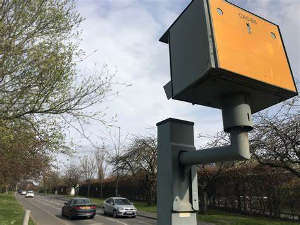Nearly Half Of Speed Cameras Inactive

Almost 46% of fixed speed cameras in England and Wales may be inactive, according to 25 out of 44 police forces. The startling revelation was revealed in a Freedom of Information (FOI) request, with answers by 25 out of 44 police forces.
The eye opening research, conducted by dash camera manufacturer Road Angel, highlights concerning figures regarding the functionality of these essential road safety devices.
The news may surprise many in the motor trade industry, particularly insurance brokers.
What are the regions with active cameras?
Among the noteworthy findings was that all eight fixed-speed cameras in Northamptonshire were inactive, while Gwent had only one active camera out of the 31 installed.
Derbyshire emerged as the region with the highest number of inactive fixed speed cameras, with a staggering 93 out of 113 cameras out of commission, leaving only 20 capable of enforcing speed limits.
Essex, Devon and Cornwall, with 110 fixed-speed cameras each, share the distinction of having the highest number of cameras throughout England. However, both regions also exhibit a significant proportion—over 40%—of inactive cameras, potentially compromising their effectiveness in curbing speeding violations.
Remarkably, only two police forces that responded to the FOI request reported all their speed cameras in working order. Dyfed-Powys in Wales and Suffolk in England, each with only four fixed speed cameras, stood out as exceptions.
The West Midlands demonstrated a commendable record with just 5% of their speed cameras inactive, indicating that 62 out of 65 devices are operational.
On the other end of the spectrum, Leicestershire raised concerns with a total of 18 fixed-speed camera sites, of which only four are functional, resulting in 78% of the cameras being inactive.
Additionally, three police forces, Durham, North Yorkshire, and Wiltshire, acknowledged having no fixed speed cameras in their jurisdictions.
These findings underscore potential challenges in maintaining and operating fixed-speed cameras, prompting a critical examination of the infrastructure and resources dedicated to road safety across England and Wales.

The implications of inactive speed cameras raise questions about their role in deterring speeding violations and ensuring public safety on our public highways.
Gary Digva, from Road Angel, said: “If a camera is inactive and remains so for many months or even years at a time, then it begs the question, why is it there?
“Yes, it may still play a part in encouraging traffic to slow down, but it could also act to distract drivers and potentially cause an accident.
“Our view is that if cameras are present, then drivers should be able to feel assured that they are working. If they are non-operational, then they should be removed.
“That is why we are calling on police forces and local authorities across the country to audit cameras and remove any non-operational devices as quickly as possible.”
All responsible private and motor trade drivers understand speed limits are not set as targets to reach and that they are there to ensure the safety of all road users.







